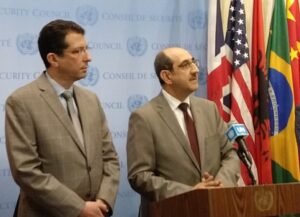United Nations, July 14 – Syria has unilaterally broken a Security Council stalemate by agreeing to allow the UN to use a contentious border-crossing to provide aid to rebel-held areas of the country on the terms of a Russian resolution that failed.
Syria’s Permanent Representative, Bassam Sabbagh, said on Thursday that his country would permit aid to be sent for six months across the Bab al-Hawa border-crossing on the Turkey frontier.
The Council-mandated access to the crossing vital for providing aid to about four million people in rebel-held areas in northern Syria had expired on Monday.
The Syrian deal to open Bab al-Hawa was brokered by Russia as a taunt to the West which had opposed a Council resolution proposed by Moscow on similar terms.
The resolution failed because it did not get the required quorum as 10 non-permanent members boycotted the vote.
Russia and China voted for it while the negative votes of the US, France and Britain did not amount to vetoes because the lack of quorum had already doomed it.
Some of those areas to which the aid will go had been hit hard by the earthquake in February that killed tens of thousands of people and the UN and relief agencies had called for at least a 12-month opening of the border.
Sabbagh said that in order to give effect to the failed Russian resolution, Syria “has taken the sovereign decision to grant the UN and specialised agencies permission to use Bab al-Hwael crossing to deliver humanitarian aid to civilian needs in the northwest Syria” for six months.
Reacting to Syria’s announcement on Thursday, Britain’s Permanent Representative Barbara Woodward dismissed its effectiveness in getting aid to the people.
“Without UN monitoring, control of this critical lifeline has been handed to the man responsible for the Syrian people’s suffering,” she said, referring to Syria’s President Hafez al-Assa.
The border-opening issue was trapped by the polarisation between Russia and the West that doomed duelling resolutions with different periods for keeping the crossing open.
Another resolution presented by Brazil and Switzerland for opening the crossing for nine months was vetoed by Russia.
China abstained rather than join in the veto, while all the other 13 Council members voted for it.
Switzerland’s Permanent Representative Pascale Christine Baeriswil said the rationale for insisting on a nine-month extension was that it would run through winter — a period when the areas would face severe difficulties.
The Council mandate for two other borders, Bab al-Salam and al-Rai, expires on August 13 and will likely face another stalemate.
Speaking to reporters about the deal, Sabbagh used the opportunity to call for lifting sanctions imposed by the West on Syria to help it recover from the damages from the earthquake.












